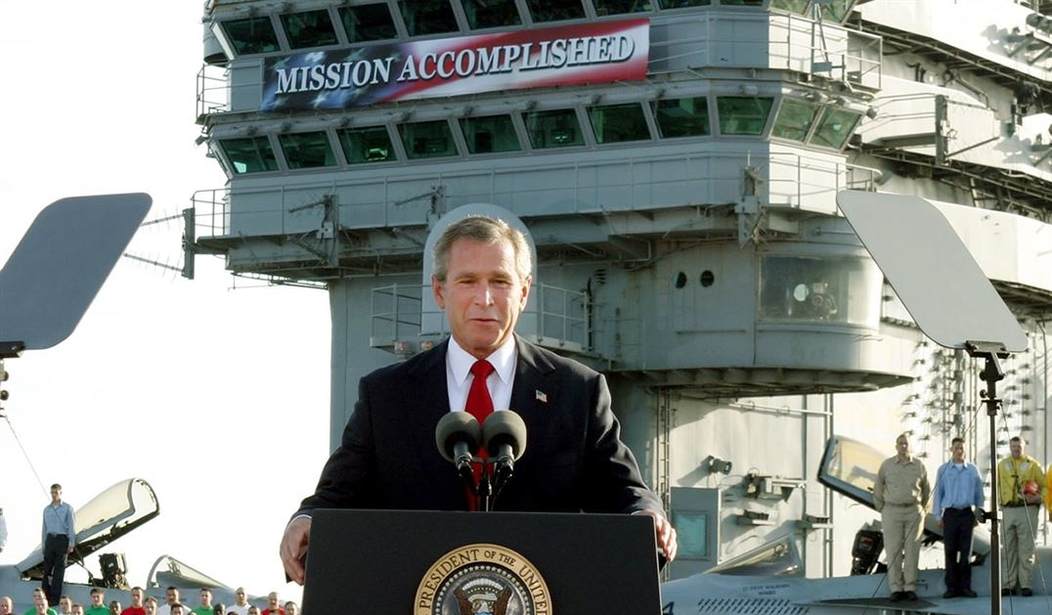Last year a vote on repealing this same AUMF drew just 11 Republican votes. Today the same measure drew more than four times as many.
Any theories why? Because I have one.
There’s no silver-bullet explanation. Partly it has to do with turnover in the House, as freshmen like Marjorie Taylor Greene, Peter Meijer, and Nancy Mace voted for repeal today without having had a chance to do so last year. And partly it has to do with a drift towards isolationism in the party that was mainstreamed by Trump and has led to populists like Matt Gaetz and Tucker Carlson demanding an end to “forever wars” without fear of a right-wing backlash.
But the obvious reason for the shift has to do with who occupies the White House. Last year repealing the AUMF would have limited Trump’s war powers. This year repealing it would limit Biden’s. The Democratic numbers between then and now are similar, with 224 D’s voting yes a year ago and 219 voting yes today. It’s only Republicans who’ve seen a sea change now that a commander-in-chief from their own party isn’t at risk of having his military options limited by repeal.
These are the 49 House Republicans who voted with most Democrats today to repeal the 2002 authorization for the use of military force against Saddam Hussein's Iraq, per the House Clerk's office: pic.twitter.com/OWL3Bzi2Ll
— Haley Byrd Wilt (@byrdinator) June 17, 2021
The final vote was 268-161. “160 Republicans and 1 Democrat think the United States remains at war with Saddam Hussein’s regime in Iraq,” tweeted former Rep. Justin Amash about the nays. The yays, meanwhile, were an interesting mix of ardent populist Trumpers (Greene, Gaetz, Paul Gosar) and Republicans who voted for impeachment (Meijer, Tom Rice, Jaime Herrera Beutler). The most famous pro-impeachment Republican, Liz Cheney, voted nay, however, as she’s a hawk above all things:
“AUMF repeal without comprehensive replacement is dangerous, misguided and ignores the security challenges facing our nation. This legislation removes a critical tool used by previous administrations – Republican and Democrat – to defeat terrorist threats originating in Iraq.
“This repeal would send a message of weakness to our adversaries and allies alike. Repealing this AUMF could prevent the U.S. from taking necessary action to counter Iranian proxies’ malign behavior, eliminate dangerous terrorists like Qassem Soleimani, and counter ISIS.
“Any repeal that is not part of a comprehensive replacement providing adequate authority to combat terrorists or those who want to do our nation harm is a vote to leave America exposed to our enemies.”
Please. The big joke about the Iraq War AUMF is how superfluous it is at this point, making repeal low-risk. When Trump targeted Soleimani last year, the AUMF wasn’t even his prime legal justification:

We’ve reached the stage of “constitutional drift” towards the executive in warmaking power that the president can target basically anyone he likes and claim inherent Article II authority to do so. But if Cheney’s still nervous about getting rid of the 2002 AUMF, she can cheer herself up by recalling that the 2001 AUMF authorizing war on Al Qaeda in Afghanistan remains on the books as it approaches its 20th anniversary. And that’s the one that can and has been twisted as needed to accommodate counterterror operations abroad against jihadis in various theaters despite the facially narrow language:

Obama used the 2001 AUMF to justify attacks on outfits like ISIS in Iraq, Syria, even Libya. “Under domestic law, and international law, the United States is at war with al-Qaida, the Taliban, and their associated forces,” he said in 2013. Basically any violent Salafist group can be shoehorned into the category of “associated forces” of Al Qaeda. And while Shiite terrorists like Hezbollah and Iranian proxies are a little trickier, Biden could probably just sweep them in under the 2001 AUMF as well by noting the relationship between Al Qaeda and Iran.
Which is to say, repealing the 2002 AUMF is essentially a symbolic act. The fact that it’ll soon be gone won’t limit the president’s counterterror abilities in any way, it seems, including in Iraq. But it’s good to have it off the books if only to set the precedent that AUMFs can and should be undone once the need for them has passed. Today’s vote might even embolden Congress to take a run at the 2001 AUMF, although the White House will be much less willing to see that one go than it is to see this one gone.
Biden has already said he supports dumping the 2002 AUMF so its fate is sealed. The only remaining suspense is whether that’s the only Iraq war authorization that gets repealed or whether the 1991 AUMF authorizing the Gulf War gets repealed too. That’s what Tim Kaine and Todd Young want to do in the Senate. I assume the House will have no objection if that’s what comes back to them from the upper chamber.









Join the conversation as a VIP Member